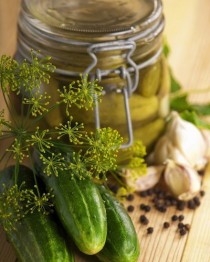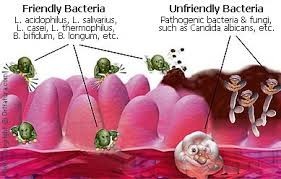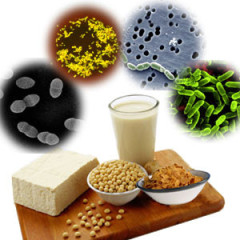Pages in this section:
1. Diabetes can be cured: probiotics
2. Curing diabetes using herbs, spices and dietary supplements
3. Curing diabetes: healthy oils
"Health begins in the gut"
It's common for many, especially members of the mainstream medical profession, to be ignorant of the importance of probiotics. While antibiotics that turn gastrointestinal tracts into killing fields are routinely prescribed, probiotics to replace lost beneficial bacteria are rarely even suggested.
Even when a doctor does give that advice, it's from the mindset that probiotics are merely important for good digestion. True enough, but probiotics, or good gut bacteria, need to comprise at least 80% of total gut bacteria for several other reasons.
Several tests and clinical studies have confirmed a strong probiotic presence with an 80/20 or 85/15 intestinal flora balance is necessary for several reasons. For example, it's been determined that probiotic bacteria communicate with and trigger immune responses throughout the body, not just in the gastrointestinal (GI) tract (http://ajcn.nutrition.org).
Testing has confirmed discoveries of the gut as a "second brain". The stronger and more balanced GI tract bacteria are, the less emotionally and mentally impaired their human hosts are (http://www.naturalnews.com). Dr. Natasha Campbell-McBride has clinically demonstrated healing all types of mental disorders and chronic allergies by applying her
GAPS (Gut and Psychology Syndrome) diet to restore proper intestinal flora balance. She even cured her autistic son this way (http://www.naturalnews.com/033094_gut_health_brain.html).
These recent developments have taken a small segment of modern medicine full circle to the ancient Chinese and Ayurvedic medical adage of health begins in the gut.
(Article from From NaturalNews, Sunday, August 25, 2013 by: PF Louis)
Tests linking probiotics to diabetes and hypertension
A 2013 study conducted in Kashan, Iran, took 54 type-2 diabetics aged 55 to 70 and divided them into two groups to conduct a randomized double-blind placebo controlled study to determine any
effects of probiotics on various
inflammatory markers among diabetes-2 patients.
One group of 27 took a freeze dried seven strain probiotic supplement while the other 27 were given placebos. The study ran for eight weeks. During this eight week trial and when it concluded, the
probiotic group's fasting plasma glucose (FPG) rose less and was continually lower than the placebo groups FPG.
Although insulin resistance rose
in both groups, the probiotic group's insulin resistance tested lower than the placebo group. Antioxidant stress was less with the probiotic group as well, with higher glutiathione plasma levels
among the probiotic group. Glutathione is
the "master antioxidant" that is created by and replenished in the liver to recycle throughout the body.
The arterial inflammatory marker of CRP (C-reactive protein) was measured by the hs-CRP (highly sensitive CRP) test that measures inflammation in blood vessels, a factor for determining heart disease potential. Yes, the probiotic
supplement group's readings were significantly lower.
Of course, the researchers concluded only the obvious by reciting only the results of this test. But it's clear that probiotics, which are without adverse effects and influence digestion positively,
also have a positive influence on type-2 diabetics' overall health. A 2009 study from the Universiti Sains Malaysia, Penang, Malaysia, reviewed several, repeat several, in vivo (animal and
human) international studies. They all (repeat all) concluded consumption of probiotics, via various mechanics and biochemical processes, reduced insulin resistance and glucose sensitivity that could
prevent onset diabetes and hypertension or assist in treating both conditions. (SO GET YOUR GUT FLORA RIGHT!!!-TH)
The Malaysian study and many others like it offer a condensation of several studies with the same theme, analyze them and offer an original or corroborating conclusion. Unfortunately, MDs are so
busy that they tend to rely on pharmaceutical reps, attend expense paid Big Pharma seminars, or glance through glossy journal publications instead of going online for these condensed reports that
present conclusions from several studies.
If they did, mainstream medicos would suggest or prescribe probiotics more as a standard of care. But you can quietly consume probiotic bacteria with supplements or fermented beverages and foods
without their advice.
http://www.naturalnews.com/041778_probiotics_type-2_diabetes_insulin_resistance.html
Type 2 diabetes breakthrough: imbalance in gut bacteria likely cause
We've all heard the news about the enormous, world-wide epidemic of type 2 diabetes. Not only is this form of diabetes (which results from the body's inability to effectively use insulin) soaring
among adults, it is now hitting children and teens as well. The World Health Organization (WHO) says the cause is primarily excess body weight and weight physical inactivity.
But breakthrough research just published in the journal Nature strongly indicates another, bottom line cause has been discovered - an imbalance of "good" versus "bad" bacteria in the intestinal tract
appears to trigger type 2 diabetes.
Sound familiar? Natural health advocates have long insisted that a healthy digestive tract is crucial to preventing and treating diseases and that making sure there's a healthy balance between the
"good" bacteria and the disease-promoting kind is key. In recent years, this concept has been backed up by numerous studies linking the overuse of antibiotics, which wipe out the "good" germs in the
gut, to serious ills. Researchers have also found that promoting a healthy internal flora rich in the "good" kind of bacteria is beneficial in a myriad of ways - including boosting the immune system
to fight flu and treating Crohn's disease and ulcerative colitis. And research recently published by Austrian scientists in the Journal of Clinical Investigation suggests an unhealthy balance of gut
flora could cause obesity and metabolic syndrome which have long been linked to type 2 diabetes.
"We have demonstrated that people with type 2 diabetes have a high level of pathogens in their intestines," lead researcher for the Nature study, Jun Wang from the University of Copenhagen's
Department of Biology and Novo Nordisk Foundation Center for Basic Metabolic Research, said in a media statement.
The research team pointed out the 1.5 kilograms of bacteria that each of us carries around in our intestines have a huge impact on our well-being. If the equilibrium of what is known as this
"microflora" in the gut is disrupted, health can suffer. For their study, the scientists zeroed in on the intestinal bacteria of 345 people from China. The 171 research subjects who had type 2
diabetes were found to have "a more hostile bacterial environment in their intestines" than those not suffering from the disease. The study suggests this kind of out-of-balance gut flora could
increase resistance to different medicines as well as likely be the trigger for type 2 diabetes. The scientists identified specific biological indicators in the gut flora that could eventually be
used to identify those at risk of type 2 diabetes as well as to diagnose the disease.
"We are going to transplant gut bacteria from people that suffer from type 2 diabetes into mice and examine whether the mice then develop diabetes," another of the lead scientists behind the project,
professor Oluf Borbye Pedersen from the University of Copenhagen, stated.
What can you do to keep your internal flora healthy and balanced? For starters, avoid antibiotics as much as possible. Also, eat a healthy diet that includes prebiotics (naturally occurring
substances found in thousands of plants species that foster a healthy environment in the colon that's hostile to the "bad" bacteria) and probiotics (the "good" bacteria that is found in fermented
foods like kefir, yogurt and sauerkraut that can crowd out bad bacteria and replenish the "good" kind that can be wiped out by antibiotics).
(Article from: http://www.naturalnews.com/037336 type-2_diabetes_gut_bacteria_imbalance.html)
The article above underscores the vital, the absolutely great importance of us having a right gut flora. A decent yogurt, Kim Chi, homemade pickles or sauerkraut, maybe even sourdough bread really helps, or supplements. Food is almost always the best way... And it is important to study how to alkalinize your body. We often drink fresh squeezed organic lemon juice regularly (best right before bedtime, then swish mouth with saltwater to neutralize the acidity for your tooth enamel's sake).
More important information:
Curing diabetes: herbs, spices and dietary supplements
Curing diabetes: refining the diet and lifestyle






